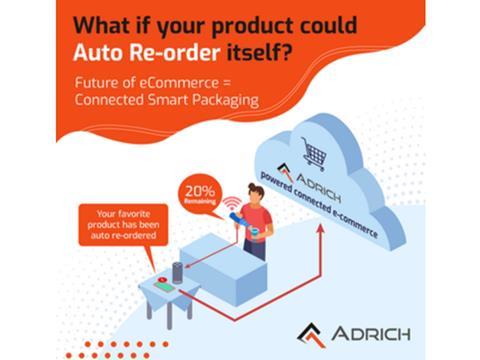
For our latest Finalist Interview ahead of the Sustainability Awards in November, we spoke to Adrich about its refillable smart label packaging solution, nominated in the commercialized Active and Intelligent category.
You’re a finalist in the Sustainability Awards 2023. Congratulations! To start off, could you summarize your entry, in less than 50 words?
Adrich is an IoT [Internet of Things] and AI powered consumption platform for brand and retailer adoption of Connected Commerce, which turns analog products into Connected products with our “smart label” platform. The platform captures real-time consumer usage data, analysing quantitative product usage, connection with consumers at consumption and product subscription models.
Why do you think the judges were impressed with your entry? Tell us about what is innovative about your project and/or about its impact on packaging sustainability.
Refill and reuse is necessary to achieve sustainability goals for brands. The math is intuitive: reusable containers with smaller footprint refills reduce packaging materials and COGS [Cost Of Goods Sold]; weight and shipping costs; single-use plastics; and other unnecessary or harmful byproducts. While the reuse business model works for brands and consumers, we haven’t yet seen the adoption of subscription-based refill and reuse.
Adrich solves the adoption problem by digitizing the entire refill and reuse system. Adrich’s privacy-compliant, connected eCommerce platform knows exactly how much product is remaining in the container, and auto-reorders refills when you need them. The value proposition for consumers isn’t just convenience and ESG [Environmental Social and Corporate Governance] benefits.
By reducing COGS and shipping costs on refills, brands can pass on refill savings to the consumer, so that after a few refills, consumers are saving money. We believe removing the financial barrier to smart packaging adoption for both brands and consumers is the first step to seeing the level of Connected Commerce adoption necessary to realize the huge sustainability benefits.
How has your innovation/initiative been received?
We’re still in the early days of Connected Commerce adoption. While the benefits to both brands and consumers are clear, when brands hear Connected Commerce, they think they need to invest millions into supply chain transformation: new packaging, new assembly lines, new go-to-market, new fulfillment.
Our hardware is a single, flexible, adhesive, and non-obtrusive label that works on liquids and solids packaging. We’ve piloted with many Fortune 50 brands with incredibly promising results in terms of adoption, connection, retention, and CLV [Customer Lifetime Value] extension. Early results show at least a 20-30% increase in repeat orders, 60% savings in just-in-time shipment of refills and nearly a 2x increase in LTV [Loan To Value] and consumer retention compared to analog (non-usage based) subscription models. We believe we’re on the cusp of a real packaging and supply chain transformation, and we are looking forward to our leading-edge industry partners joining us here.
You’re shortlisted for the Active and Intelligent category. What do you see as the key demands and challenges in relation to smart packaging?
Cost is the biggest barrier to smart packaging adoption today. When something has been done the same way for so long, it’s hard to change, and it can be expensive. Convenience and sustainability are great value propositions to motivate behaviour change, but especially in highly competitive, tight-margin, consumer-facing industries, it must make financial sense as well. We just rolled out version 4.0 of our IoT hardware, which is already 30% cheaper than our initial prototypes and it’s still coming down.
Connected Commerce will be the future of the industry – it’s a matter of ‘when’, not ‘if’. The early adopters will have a massive head start against the rest of the industry by locking consumers into their first-to-market smart replenishment platforms. Those first movers are investing today, because they know the technology costs will come down and they know what it means in terms of market share going forward.
What do you think are the main opportunities in this area or what future innovations do you predict in this area?
We’re fascinated by how the pandemic has dramatically accelerated the global adoption of QR codes. If QR represents the natural evolution of RFID, we believe Adrich has developed the next evolution of the QR code. Our add-on to the evolutionary chain is that our platform unlocks two-way communications between brands and consumers, not just a one-way, point-in-time interaction based on the scanning of a code.
Now it’s possible for brands to communicate with consumers not just at the point of purchase, but at the actual point of consumption, even we haven’t exhausted all the use cases that will arise from closing this last-mile gap. We’re learning from our brand partners every day on how this interaction will accelerate and unlock value propositions for both brands and consumers, and we can’t wait to see what they come up with next.
The winners of the Sustainability Awards 2023 will be announced at the Sustainable Packaging Summit, which takes place in Amsterdam on 14-15 November. The Summit mobilizes leaders of the FMCG value chain, policymakers, NGOs, recyclers and investors to collaborate, remove barriers and identify opportunities on the road to sustainable transformation.
To learn more or register, visit https://www.packagingsummit.earth/amsterdam2023/.
If you liked this article, you might also enjoy:
The L’Oréal approach to packaging sustainability
What steps is Apple taking to make its packaging more sustainable?
How did Brazil achieve its 100% aluminium can recycling rate – and can it be replicated in the EU?
Experts have their say on the EU’s Packaging and Packaging Waste Directive revisions













No comments yet